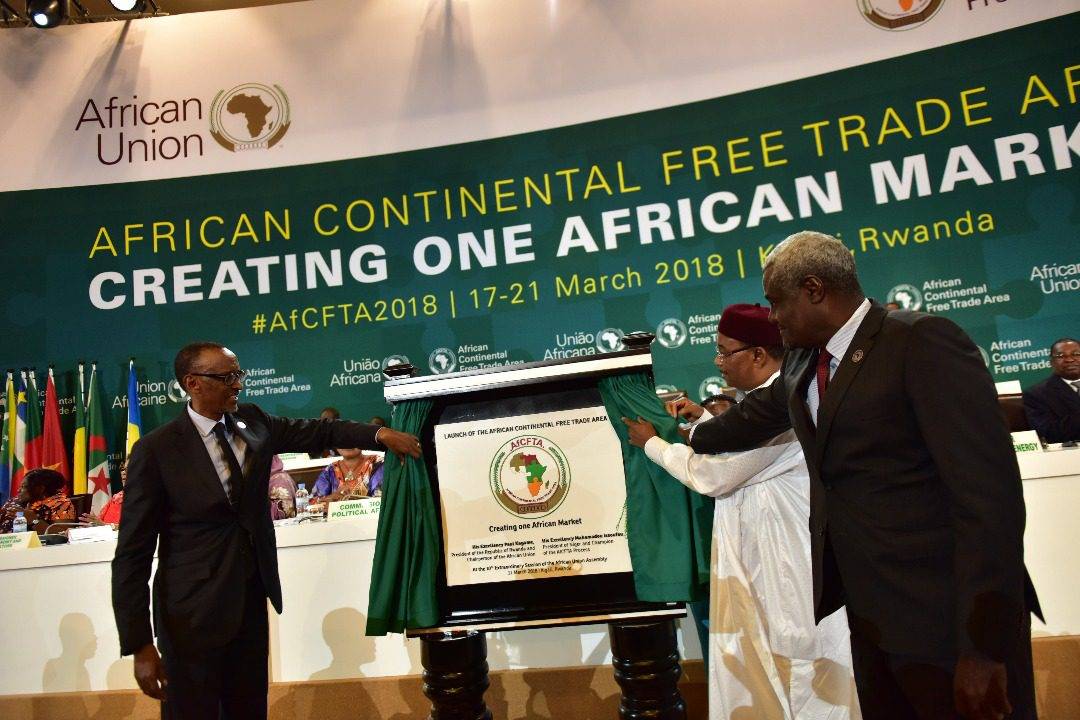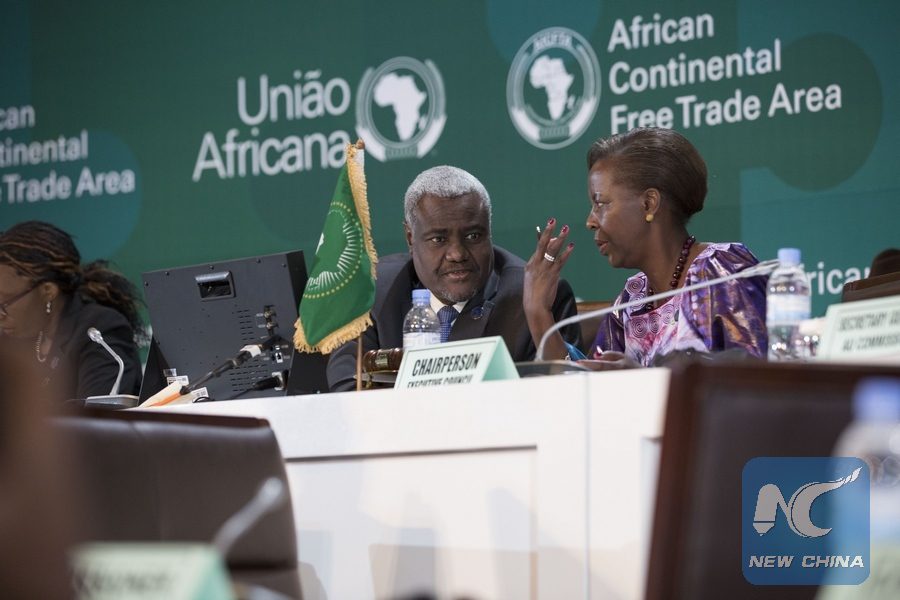Africa’s Free Trade Agreement Is A Lifeline In The Economic Battle Against COVID-19

The African Continental Free Trade Agreement (AfCFTA) aims to turn Africa into one big, functional market. Potentially to birth the largest free trade area in the world, the agreement is taking pages from China’s playbook, an economic initiative which gave birth to Shenzhen.
Needless to say, African economies are walking on thin ice. Fragile, to say the least, the region’s wealth is under the threat of losing billions to the novel coronavirus pandemic. As the World Bank’s Africa Pulse puts it, Sub-Saharan Africa is at risk of going into recession for the first time in 25 years.
Compounded with the debt, fragmented systems and hampered growth African economies already face, COVID-19 isn’t an issue the continent can afford on its own. However, a silver lining lies behind the economic dark cloud—the AfCFTA.
Backstory
Africa’s interconnectedness to affected economies in the European Union, China and the United States is causing ripple effects. As a result, the region stands the risk of losing half of its USD 2.58 Tn gross domestic product (GDP). Growth might fall due to many coronavirus-inspired reasons, prominent of which is the disruption of global supply chains.
Only about 15 percent of African exports can be traced to other African countries. Meanwhile, exports between Asian nations are around 58 percent and growing. Also, commerce between countries in Europe accounts for 67 percent of the total. Obviously, intra-trade in what is the worlds’ second-largest continent is less than it should be. Then, the coronavirus hit.
Nevertheless, an opportunity exists in the continent taking full advantage of trading within the continent, pending when international dealings would get back on their feet. As it seems, a well executed AfCFTA would go a long way in reducing Africa’s dependence on most things global, thus boosting the region’s internally generated wealth.
Perhaps for these reasons, the African Continental Free Trade Agreement remains bullish despite the rampage of the coronavirus. The agreement will go as planned, to commence on the previously stipulated July date. The African Union has taken it upon itself to make sure the date will not be postponed.
According to shared insights to WeeTracker from the AfDB, COVID-19 could cost Africa a GDP loss of USD 22 Bn in the base-case scenario and USD 88.3 Bn in the worst. This is equivalent to a projected GDP growth contraction of between 0.7 and 2.8 percentage points in 2020. The shock will further squeeze fiscal space as deficits are estimated to widen by 3.5 to 4.9 percentage points, increasing Africa’s financing gap by an additional USD 110 Bn to USD 154 Bn.
Present Chance
The world has more or less shut down and trade relations have significantly reduced. It will take plenty of time and a load of doing before things can go back to normal. It’s hard to predict the impact of the pandemic as the world yet struggles to respond to it. Equally challenging is the attempt to forecast COVID-19’s influence on the AfCFTA.
Nevertheless, there are grounds which lead to believing that the African Continental Free Trade Agreement will be implemented as planned on July 1, 2020. In the same way, it is unlikely that states will conclude the needed negotiations, like the scheduling of tariff concessions and actual commitments.
Andoh Mensah, Manager, Trade and Investment Climate at the African Development Bank (AfDB), believes it is unclear when the targets for the AfCFTA will be met, making analysis difficult, and perhaps even risky. In his opinion, there has never been a time when limiting dependence on external partners helped to completely resolve any challenge.

COVID-19 has proven that no one is alone, and no country can single handedly fight the pandemic. Developing countries and, indeed, industrialized nations, alike, are all dependent on international trade for access to critical technology, medical supplies, medicines and vaccines to save patients suffering from advanced stages of the coronavirus.
“An effective AfCFTA allows for the technology to proliferate quickly. An effective AfCFTA regime could promote greater alignment between public health and trade policies to arrest the escalation of the pandemic and save lives, through (i) calculated policy and information coordination and (ii) well-executed trade regimes, investments and trade facilitation,” Mensah told WeeTracker.
Prime Sectors
The pandemic has disrupted global supply chains and created poor trading conditions. Small and medium enterprises (SMEs) are obviously the worst hit in the continent. As a result, Africa is set to lose some 20 million jobs on a wider scale, according to a study by the African Union (AU).
The African Continental Free Trade Agreement must promote a regional approach to developing trade, industry, business and healthcare for the continent as a whole. It must create a conducive environment to actively shape and create markets that deliver sustainable and inclusive growth.
“A fully implemented AfCFTA, for instance, could create an environment conducive for African regional value chains, and regional champions. Eventually it could form continental champions in the local production of pharmaceuticals across select hubs that can support inter-regional trade for mutual economic benefits but also support investments locally,” Mensah added.
He shares that African pharmaceutical firms have the opportunity to produce generics (the way India did). In the regional cooperative alliances, Africa’s representation at the World Trade Organization (WTO) could be used as a bloc to limit. This way, the tremendous efforts made to develop the AfCTFA won’t go down the drain.
Or, they can remove the intellectual property (IP) restrictions and charges on essential drugs and vaccines. Such measures may help offset potential economic fallouts by countries. If successful, the United Nations Economic Commission for Africa estimates that the agreement will boost intra-African trade by 52.3 percent by 2022.
Opportunity Vs Crisis
Indeed, Africa has the avenue to take things back to factory settings and reconfigure them in a way that would be of great benefit. Wamkele Mene, the Secretary-General of the African Continental Free Trade Area, has urged Africa to not be disheartened by the troublesome effects of the coronavirus—from a trade perspective.
The South African urged Africans to view the current situation which has negatively affected global trade, capital markets, supply chains and public health as an opportunity rather than a crisis. He said he would initiate talks with the Commissioner for Trade, UN ECA and UNCTAD to make sure things go as planned.
“Through the AfCFTA, we have an opportunity to reconfigure our supply chains, to reduce reliance on others and to expedite the establishment of regional value chains that will boost intra-Africa trade,” he told delegates in a March function in Addis Ababa.
According to him, the African Continental Free Trade Agreement offers Africa an opportunity to confront significant trade and economic development challenges which have resulted in a very low percentage of intra-Africa trade. Indeed, joining hands to transform trade within Africa would prove more beneficial than overseas dealings.
It is estimated that African governments could lose 20 to 30 percent of their fiscal revenue, estimated at USD 500 Bn or more. Exports and imports are projected to drop by at least 35 percent from 2019 levels, incurring a loss in the value of trade of around USD 270 Bn. The fight against the virus’ will lead to an increase in public spending of at least USD 130 billion.
The Spoils
African economies boosting other African economies is definitely a plus at this time. A lot can be made up for if the Ghanaian cocoa can be transported to Nigeria and if Lesotho’s beverages can be taken to Burundi. Nonetheless, there isn’t sufficient data to predict whether the trade agreement’s proceeds can make up for what’s lost during the coronavirus battle.
Stephen Karingi, Director of the ECA’s Regional Integration and Trade Division urged African countries that export drugs to prioritize selling on the African market. The intra-African market could help mitigate some of the negative effects of COVID-19 through limiting dependence on external partners, especially in pharmaceuticals and basic food, he said.
Well, Africa spends USD 16 Bn on drugs annually, depending heavily on China and other countries in Europe and Asia for its pharmaceutical supply. At present, some of these markets are badly affected by the current COVID-19 pandemic. If African nations start producing drugs themselves and sell within, it would not only be cheaper but also help secure quality and safer supply.
A couple of think tanks have advised Africa to become more conscious about food distribution during these trying times. The African Continental Free Trade Agreement, going forward, can do a lot to make this achievable.
Of the over a dozen African countries that are net exporters of food, only a few of them sell within the region. Though some borders are currently closed, things can be turned around to limit dependence on the western world.
“We need to maintain momentum on AfCFTA as a mechanism for building long term continental resilience and volatility management by increasing, for example, intra-African trade on basic food products,” Karingi said.
Featured Image: Ethiopia Insight